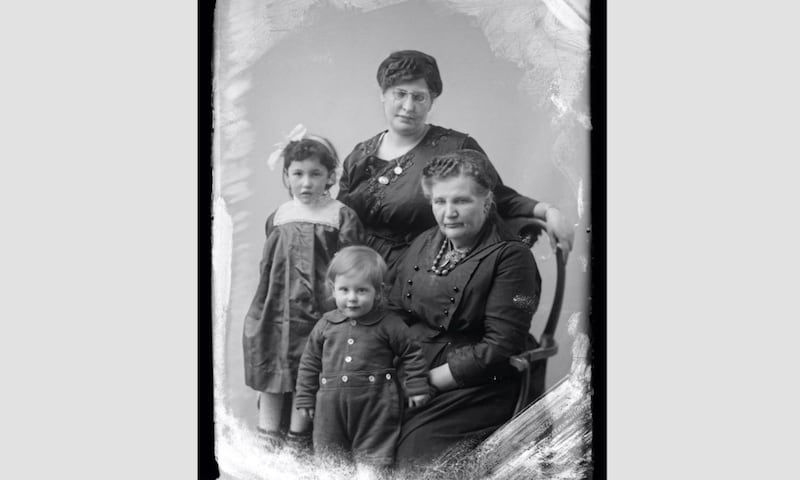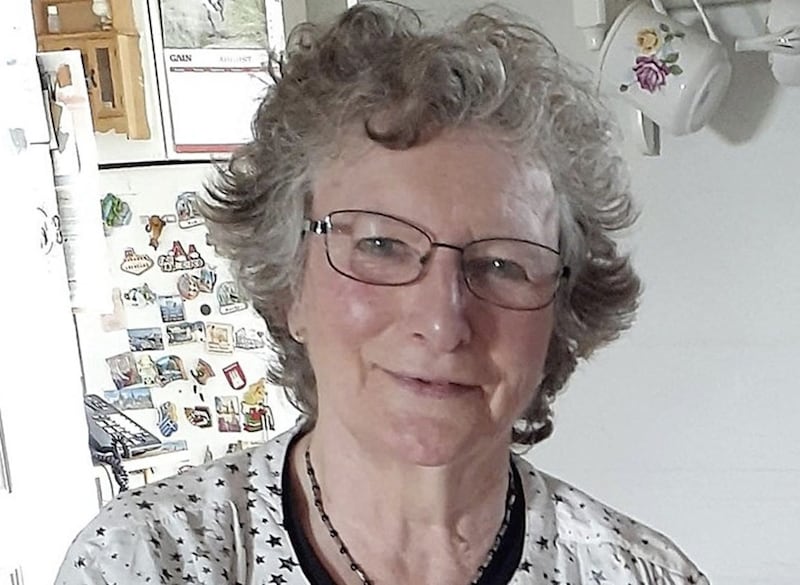LILL Saether knows exactly what happened to her family during the Holocaust. Although she was born after the war she can give an almost day-by-day account, because her mother told her parts of what happened, and because her grandmother kept a diary from 1940 to 1945 which still exists.
What makes Lill's story unique is that some of her relatives were saved because the family lived for approximately 20 years in Newry.
A tiny item in the London Jewish Chronicle, on 6 March 1903, records that her great grandfather, Abraham Freeman, originally from Russia, but then of Newry, had naturalised as a British citizen. His wife, Rhoda Yetta, and their children also became British subjects.
Lill doesn't know for sure why her family arrived in Newry. They were east European Jews who, like millions of others, were escaping persecution and seeking a better life. For most the goal was New York rather than Newry.
The story goes that they were victims of fraud by the captain on the ship that brought them, to believe they had arrived in New York.
There was a tiny cluster of Jewish families in the town – but not enough to form a synagogue.
Leonard Abrahamson, a pupil at the Christian Brothers school in Newry, was a Gaelic scholar and future president of the Royal College of Physicians of Ireland.
"My family were also received well in Newry," Lill says. "My great grandparents, Abraham and Rhoda, were living at Cecil Street at the turn of the century – Abraham was a tailor, general dealer and commercial traveller. My grandmother, Florrie, was married at 30 Mill Street in 1906, one of her sisters got married at Newry Town Hall. Her youngest brother was born in Newry and qualified as a doctor."

Lill's grandmother began married life with her husband, Joseph Mendel, at 7 Kilmorey Terrace, and was rearing three young children, among them Lill’s mother Elsie, when in in 1911 the family moved to Norway. Joseph, opened a shop in Trondheim, where two more children were born. The business failed – "Ireland is better than Norway", the family complained – and by the early 1930s they had moved to the capital, Oslo.
In April 1940 Germany invaded Norway, occupying it for the rest of the war. The Nazis brought with them their hatred of the Jews. Even though the Norwegian Jewish community numbered only two thousand, they were targeted for persecution.
Oppression started with executions of trade union leaders and those accused of resistance, as well as legal restrictions and random attacks against Jews. There was oppression of the Norwegian population in general. There was massive censorship, radios were banned, many newspapers were closed down.
The persecution of Norway's Jews intensified when the pro-Nazi collaborator and leader of the Norwegian Nazi Party, Vidkun Quisling, became premier in February 1942.
Jews were issued special identity cards, made to fill in four-page forms detailing all their property and business interests and the authorities demanded membership lists of all Jewish associations.
Lill is sometimes asked why the Jews didn't understand what was going to happen to them. She believes that in the first year or two of the occupation many in the community clung to the hope that they could get through this difficult period in Norway.
They told each other that they were so few, and thus irrelevant in the big picture, and they abided by the rules, so hopefully they would be left alone. However, by October 1942 her own family and many others were desperate to flee the country. But by that time it was extremely dangerous. Both those escaping and anyone helping them faced torture and execution.
The Nazis meanwhile were preparing the "final solution to the Jewish problem” in Norway.

In October a group of fleeing Jews were challenged by border police on a train. They had neither identity cards nor permission to travel. The non-Jewish guide, who was to take them across the border to Sweden, panicked and shot one of the policemen dead. Both him and the fleeing Jews were arrested and killed.
The Nazi-controlled press spewed out hatred against the entire Jewish community and called for revenge.
On October 26 the Norwegian police and SS came to arrest all Jewish men across the country and seize Jewish property.
Lill says: "This was an enormous bureaucratic exercise. In the state archives I've seen the lists drawn up by civil servants of arrested Jews, not arrested Jews, Jews in hospital etc. There are also lists of my own family's possessions – down to individual items of my grandparents' furniture and other belongings."
What the family could save from the confiscations they gave to their gentile lodger – a shipyard worker, who took away silver wear, jewellery, family photographs and documents. Every item was returned after the war.
When the police and Gestapo arrived in the flat to arrest the males none were present. Lill's grandfather, Joseph, was in hospital recovering from an operation. Her uncle, Harry Isidor, a musician, was working in another town. The police warned that unless he gave himself up to the authorities immediately the whole family would suffer.
"The next morning Harry Isidor came to the family home to say goodbye to his mother looking so sad," Lill says. "He also came to the shop where his sister Elsie, my mother, was working and to the hospital where his father was admitted, to say goodbye”.
Later that day Harry Isidor gave himself up at the police barracks.
Immediately prior to November 26 the news leaked that the Nazis were going to round up the entire Jewish community that day, including women and children. While often described as a "German round-up" Lill says the action required widespread collaboration – Oslo's police, the State Police and the Norwegian Ministry of Justice participated in it. But many also risked their lives to try and warn Jews.
That morning the police and Gestapo returned to the family flat. All four women – Lill's grandmother and her three daughters – were at home.
But Lill's mother protested. "We are British citizens", she said. "You have no right to arrest us." She had heard that citizens of the UK, USA and a few other countries, were not to be detained, at least at that time, until the Nazis had worked out what to do with them.
The police ordered the daughters to prove their citizenship. They produced the passports issued to them years before in Newry following Abraham's naturalisation. But the youngest daughter, Esther, who had been born in Norway, had no British passport. She was arrested and taken away.
The photographs of the Jews at the quay can't convey the violence and fear as they were forced on to the deportation ship, the Donau. Esther and Harry Isidor, who had been in prison since the arrest in October – Lill's uncle and aunt – were on board that ship.
It took the Donau four days to reach the Polish port of Stettin , in rough seas and terrible conditions. On arrival the Jews were forced on to waiting trains, each wagon, designed for cattle, crammed full with people, had no seats or even space to sit on the floor.
Nearly 28 hours later, without food or water, the trains arrived at Auschwitz. Within hours of arrival, on December 1, Esther was gassed, with all the other women and children in the transport.
Harry Isidor, with the other men, underwent a selection procedure: those deemed unfit for hard labour would be killed. As a disabled man who could not disguise his limp, he too was murdered on December 1.
Of 773 Jews who were deported by the Nazis from Norway, only 38 men survived the war. Altogether six million Jews were murdered, about one and a half million of them were children.
In Norway Lill's grandfather, Joseph, was hiding in the hospital, after recovering from his operation. The doctors and nurses saved Jewish patients. They induced fevers and even rendered some unconscious so that the Nazis would not take them away. Lill has discovered the various dates the Germans arrived at the hospital to arrest her grandfather. In the end they gave him 14 days until they would be back to arrest him.
One week before the 14 days expired, on December 8, Lill's mother arrived at the hospital in the middle of the night. Her best friend was in the Norwegian resistance and she also had contacts at the hospital. A nurse with a torch led her through a back entrance and up some stairs. She collected her grandfather and another Jewish patient and took them into hiding in Oslo.
A group of Norwegians, including an ex-police officer, had organised an escape route for Jews and others in danger. Every evening two lorries each carried 20 fugitives hiding under sacks and packaging. Police and guards were everywhere but somehow the escape operation worked for two months.
The leader of the escape organisation was present on every trip. He spoke fluent German, knew the backroads to the border region, and managed to evade checkpoints and patrols or talk them out of the situation if they were stopped.
After a four-hour journey, in the bitter cold, they walked the last 500m through a forest clearing and across an unfenced stretch of the border. There Swedish border control police welcomed them with hot drinks, food, and warm clothes. From there they were transported to different parts of Sweden where they were safe for the rest of the war.
Lill feels it extremely important to share her family's story. She frequently visits Ireland on holiday. She is drawn to the scenery and the people. But the country means much more to her: because of the family's time in Newry her grandparents, her aunt and mother were saved from the Holocaust. Otherwise she wouldn’t be here today.
Wednesday January 27 is Holocaust Memorial Day. On Tuesday January 26 at 7pm Lill Saether will present 'From Newry to Norway. How my mother survived the Holocaust,' an online event hosted by the Public Record Office of Northern Ireland. The event is free but pre-booking is required, via the Eventbrite website.








